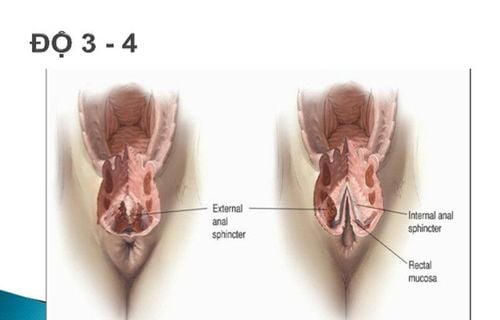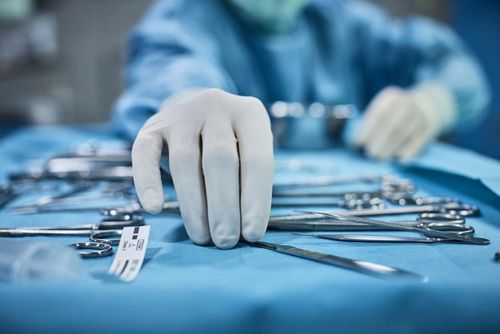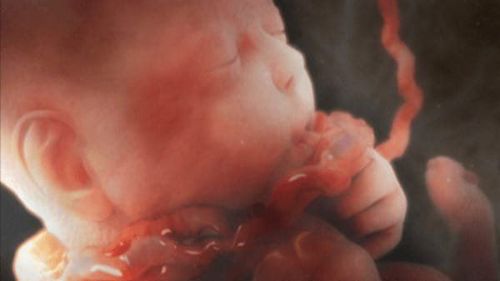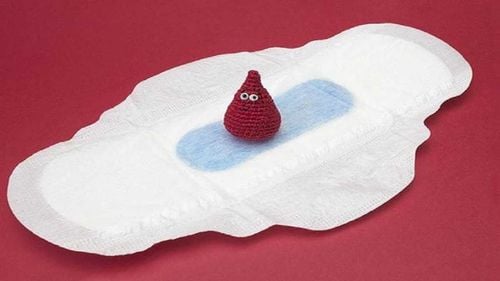This is an automatically translated article.
The article was professionally consulted by BSCK II Pham Thi Tuyet Mai - Department of Obstetrics and Gynecology - Vinmec Hai Phong International General Hospital.1. Recognizing postpartum discharge
Postpartum discharge is the fluid that flows from the uterus through the vagina when a mother has just given birth and begins the postpartum period. The discharge usually consists of clotted and thin blood flowing from the lining of the uterus, lining tissues, and possibly bacteria. When the placenta detaches from the uterus during childbirth, it causes the blood vessels at the place of contact between the placenta and the uterus to burst, this blood will flow into the uterus, then out through the vagina. . After the placenta is completely expelled from the body, the uterus will contract to help close the blood vessels to reduce the amount of blood out.Postpartum discharge may vary from woman to woman and depends on the mother's method of delivery. The amount of blood in the body usually increases quite a lot during pregnancy, so postpartum bleeding rarely causes anemia.
Trắc nghiệm: Bạn có hiểu đúng về dấu hiệu mang thai sớm?
Các dấu hiệu mang thai sớm không phải chỉ mỗi trễ kinh mà còn có rất nhiều dấu hiệu khác như xuất huyết âm đạo, ngực căng tức,… Điểm xem bạn biết được bao nhiêu dấu hiệu mang thai sớm thông qua bài trắc nghiệm này nhé!

2. Return of menstruation after giving birth
The factors that affect the return of the menstrual cycle after giving birth can be mentioned as:How long or fast the mother's body recovery time: If the mother's body recovers quickly, the menstrual cycle will be faster. appear quickly and vice versa. Breastfeeding mothers often have a longer period than mothers who do not breastfeed directly. Hormonal changes: A woman's hormones often change after giving birth and this will directly affect how quickly or long her period returns. Mother's psychology: After the baby is born, women often have a lot more things to worry about, most mothers will feel tired, this factor will have a strong impact on the return of the menstrual cycle.
3. When will the woman have her period again?
Usually, women can have their periods again after 6 weeks of childbirth, when the mother's body has returned to its pre-pregnancy state. The female hormones progesterone, estrogen, and HCG also returned to normal levels. However, the time it takes for a woman to start menstruating again depends on many factors.Breastfeeding has a great influence on the postpartum menstrual cycle. Women who exclusively breastfeed and breastfeed 2 to 3 times at night may have their periods again after 6 months or even later. Women who are not breastfeeding can usually get their period after about 6 weeks.

4. Postpartum discharge and postpartum period are not the same?
It can be seen that the time of postpartum discharge and menstruation is not the same. However, there are still women who, after not long after the cessation of discharge, have their periods again with bright red blood color, the amount of bleeding is average and decreases day by day, no more than 7 days and then it goes away on its own. After the discharge has stopped, if you have bleeding for no more than 7 days, the color and amount of blood is similar to menstruation, it is very likely that this is the return of the period. However, if bleeding persists for more than 7 days, you need to see a doctor to determine the cause. In some cases, the mother is breastfeeding, sometimes there is a little blood in the vagina and then it goes away on its own, it is still completely normal, nothing to worry about.5. Abnormal postpartum period
Menstrual cycles that last more than seven days or that have large blood clots. Spotting Vaginal Bleeding Between Cycles Menstruation has started again but then goes away for a long time. If the menstrual irregularity lasts too long, after 1 year, it is still irregular or has unusual symptoms such as: vaginal odor, itching, blood clots, vaginal bleeding or severe abdominal pain, the mother needs to go. See your doctor right away for prompt diagnosis and treatment. However, menstrual irregularity after childbirth is also a normal phenomenon, mothers should not be too worried and can improve by: cleaning the intimate area clean, not overusing cleaning solution, not douche The vagina is too deep to avoid infection, pay attention to rest, eat enough nutrients, and do light exercise to improve the body's resistance for a healthy body.Dr. Tuyet Mai has over 30 years of experience in examination and treatment in the field of Obstetrics and Gynecology, especially in lower-line surgery, family planning, specialized laparoscopic surgery, and multi-surgery management. severe and difficult such as:
Hysterectomy, hymenectomy Surgery for uterine fibroids, cervical cancer Cervical cancer vaccination Cervical cancer early detection Cervical electrocautery Examination and treatment endocrine therapy
Please dial HOTLINE for more information or register for an appointment HERE. Download MyVinmec app to make appointments faster and to manage your bookings easily.














